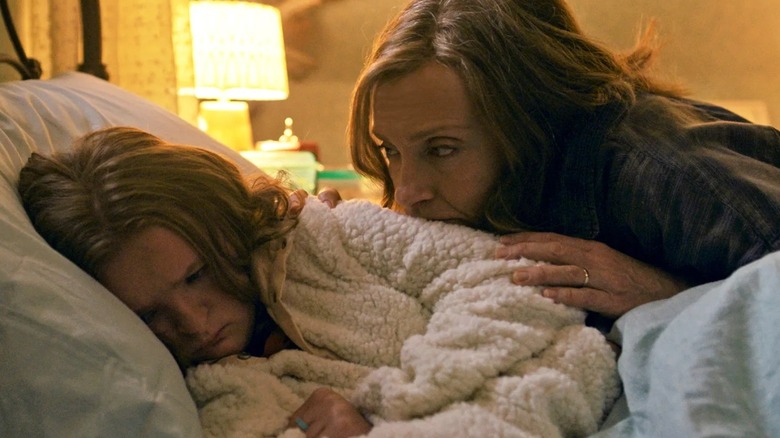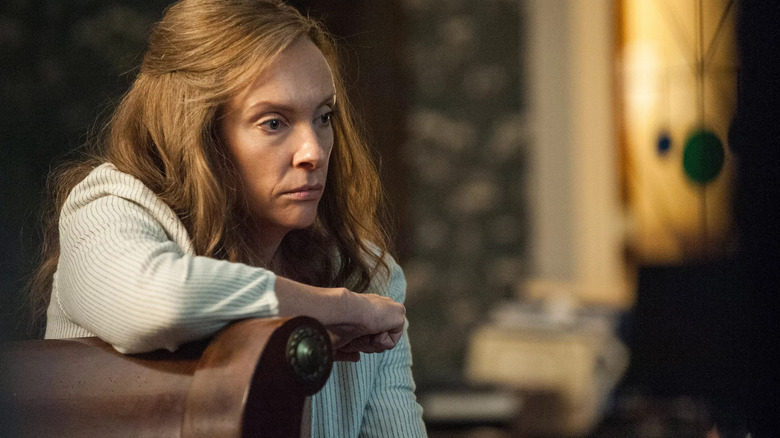Ari Aster Convinced His Hereditary Editor To Join By Explaining It Wasn't A Horror Film
Ari Aster's 2018 film "Hereditary" contains a great deal of shadow-lurking, a scene of spontaneous human combustion, several decapitations, allusions to demonic powers, and at least one Satanic cult. However, if one were to ask a "Hereditary" fan about the film, they would mention Toni Collette's amazing performance before any of the above elements. They will also likely recall the scenes of sheer panic, the harrowing sense of guilt, and the unnerving presence of actor Milly Shapiro as the scary young Charlie. This is, of course, the way Aster wanted it. "Hereditary" may have supernatural elements, but it is, first and foremost, a story about the breakdown of the family unit. It's about intergenerational trauma and how our most grievous pains are handed directly to us by our mothers. It's a nightmare, but more in the Freudian sense.
"Hereditary" was edited by Lucian Johnston and Jennifer Lame, the latter of whom has established an impressive career in the last five years. Lame served as an assistant or an apprentice on noteworthy films like "Before the Devil Knows Your Dead" and "Reservation Road" before becoming a full-time editor with the Parker Posey film "Price Check" in 2012. She has also served as the editor on five of Noah Baumbach's films, edited "Black Panther: Wakanda Forever," and collaborated with Christopher Nolan on "Tenet" and "Oppenheimer."
/Film's own Bill Bria recently sat down with Lame to discuss editing and her amazing run of work. She revealed that modern horror wasn't to her taste — she prefers the classics — but that Aster was able to convince her to work on "Hereditary" by explaining that it wasn't a horror movie, not really. It was about a really, really, really troubled family. Lame could deal with that.
A family that's f***ed up
Lame noted that she doesn't take just any editing job, she takes the ones she feels she can really handle well. When it comes to modern genre movies, Lame admitted that she's not a fan. It seems that Lame assumed Ari Aster, in making a modern horror movie, might be a ghost and monster enthusiast, eager to delve into the more ghoulish aspects of the genre. Lame seemed startled to learn that Aster was actually a bigger fan of modern, downbeat indie dramas, including 2016's "Manchester by the Sea" (which Lame worked on with writer/director Kenneth Lonergan). She explained:
"I tried to get out of 'Hereditary,' because I was like, 'I don't know genre. I don't like modern-day horror movies. I like old horror movies. I love Hitchcock and old suspenseful dramas, but I don't want to do this.' Then he called me and he talked about Mike Leigh and his love of Mike Leigh and Bergman, and he loved 'Manchester by the Sea' and he loves Kenny. And I was like, 'Oh.' He's like, 'I'm not trying to make a horror movie. I'm trying to make a great f***ing movie that happens to deal with horror, about a family that's f***ed up.' And I was like, 'Okay, I can do that.'"
While several of Lame's films have fantastical elements — "Wakanda," "Hereditary," and "Tenet" all feature broad genre conceits — most of her work has been on grounded, intense dramas (she also worked on Sebastián Silva's "Tyrel," Shaka King's "Judas and the Black Messiah," and Andrew Dominik's controversial "Blonde"). It seems if a director can communicate to their crew and to the audience that their genre film is about something more than its fantasy, then Lame will happily get on board.

